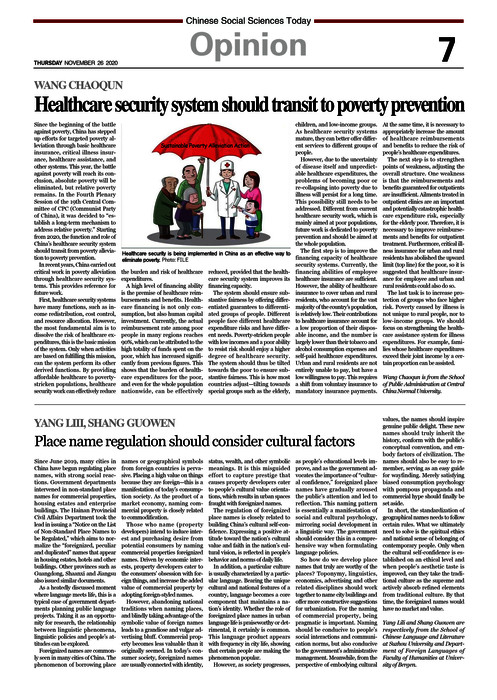Place name regulation should consider cultural factors
2020-11-24 16:16:58
Since June 2019, many cities in China have begun regulating place names, with strong social reactions. Government departments intervened in non-standard place names for commercial properties, housing estates and enterprise buildings. The Hainan Provincial Civil Affairs Department took the lead in issuing a “Notice on the List of Non-Standard Place Names to be Regulated,” which aims to normalize the “foreignized, peculiar and duplicated” names that appear in housing estates, hotels and other buildings. Other provinces such as Guangdong, Shaanxi and Jiangsu also issued similar documents.
As a heatedly discussed moment where language meets life, this is a typical case of government departments planning public language projects. Taking it as an opportunity for research, the relationship between linguistic phenomena, linguistic policies and people’s attitudes can be explored.
Foreignized names are commonly seen in many cities of China. The phenomenon of borrowing place names or geographical symbols from foreign countries is pervasive. Placing a high value on things because they are foreign—this is a manifestation of today’s consumption society. As the product of a market economy, naming commercial property is closely related to commodification.
Those who name (property developers) intend to induce interest and purchasing desire from potential consumers by naming commercial properties foreignized names. Driven by economic interests, property developers cater to the consumers’ obsession with foreign things, and increase the added value of commercial property by adopting foreign-styled names.
However, abandoning national traditions when naming places, and blindly taking advantage of the symbolic value of foreign names leads to a grandiose and vulgar advertising bluff. Commercial property becomes less valuable than it originally seemed. In today’s consumer society, foreignized names are usually connected with identity, status, wealth, and other symbolic meanings. It is this misguided effort to capture prestige that causes property developers cater to people’s cultural value orientations, which results in urban spaces fraught with foreignized names.
The regulation of foreignized place names is closely related to building China’s cultural self-confidence. Expressing a positive attitude toward the nation’s cultural value and faith in the nation’s cultural vision, is reflected in people’s behavior and norms of daily life.
In addition, a particular culture is usually characterized by a particular language. Bearing the unique cultural and national features of a country, language becomes a core component that maintains a nation’s identity. Whether the role of foreignized place names in urban language life is praiseworthy or detrimental, it certainly is common. This language product appears with frequency in city life, showing that certain people are making the phenomenon popular.
However, as society progresses, as people’s educational levels improve, and as the government advocates the importance of “cultural confidence,” foreignized place names have gradually aroused the public’s attention and led to reflection. This naming pattern is essentially a manifestation of social and cultural psychology, mirroring social development in a linguistic way. The government should consider this in a comprehensive way when formulating language policies.
So how do we develop place names that truly are worthy of the places? Toponymy, linguistics, economics, advertising and other related disciplines should work together to name city buildings and offer more constructive suggestions for urbanization. For the naming of commercial property, being pragmatic is important. Naming should be conducive to people’s social interactions and communication norms, but also conducive to the government’s administrative management. Meanwhile, from the perspective of embodying cultural values, the names should inspire genuine public delight. These new names should truly inherit the history, conform with the public’s conceptual convention, and embody factors of civilization. The names should also be easy to remember, serving as an easy guide for wayfinding. Merely satisfying biased consumption psychology with pompous propaganda and commercial hype should finally be set aside.
In short, the standardization of geographical names needs to follow certain rules. What we ultimately need to solve is the spiritual ethics and national sense of belonging of contemporary people. Only when the cultural self-confidence is established on an ethical level and when people’s aesthetic taste is improved, can they take the traditional culture as the supreme and actively absorb refined elements from traditional culture. By that time, the foreignized names would have no market and value.
Yang Lili and Shang Guowen are respectively from the School of Chinese Language and Literature at Suzhou University and Department of Foreign Languages of Faculty of Humanities at University of Bergen.


